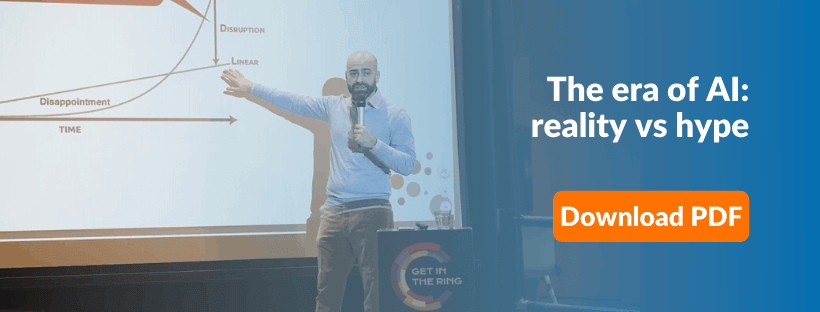This piece is an excerpt from an article based on a presentation delivered during Neoteric AI Talks Amsterdam on March 5th, 2020, and it includes questions from the audience presented in bold. You can download the full article through the banner at the bottom.
Speaker: Amir Sabirović
InterWorks Managing Director Netherlands & Digital Strategist
High-tech is the red thread that runs through his career DNA as he aims to know how things work on a deep technical level and understand the strategic impact of the solutions. The technological interest in combination with a passion for business and entrepreneurship led Amir to become the founding father of an Artificial Intelligence startup as part of the management consultancy firm.
***
Becoming a digital frontrunner
Adopting new technologies helps companies gain and maintain a competitive edge, but can also pose many challenges. In the past, IT was not at the heart of every business, leading to many organizations remaining digitally primitive. In this article, Amir Sabirović talks about the reality of becoming a “digital frontrunner” and AI today.
InterWorks is a data-driven company oriented towards helping the companies to become digital frontrunners through technology. Another aspect which they also emphasize is the cultural change.
Let’s start with the basics first. What is a digital frontrunner?
IoT, Big Data, blockchain – all these are notions dazzling within companies, with artificial intelligence as the cherry on top. What is interesting is that though all of those businesses are talking about these notions, 9 out of 10 companies that you enter are digitally primitive, meaning that they still have legacy systems, no interconnected data, and there isn’t any alignment within. These companies were established from an operational, strategic perspective, and then at some point, IT was added – IT has never been in the primary process.
Becoming a digital frontrunner means setting up the points of where you are, accepting the reality that you may be primitive in technological advancements, and realizing what you need to do. In the past, IT was supporting the primary processes in most organizations, and today, IT is the primary process. If you cut off the electrical power in every company, they will cease to exist. Everything has moved online, everything is consumed online. If you are not in the technological realm, you’re falling behind. There are fast-movers like startups that have challenging business models, platforms, and they just surpass you with one individual product that you’re offering today, but if you have 10 of those covering all your products, you’re out of business. So IT is the primary process, and you need to build your business models on top of that. If you’re not aware of that, then I’m sorry for you, but between 3 and 10 years from now, you’ll be out of business.
Right now, technologically, we’re moving exponentially, but we’re still stuck in linear thinking. For example, I just came from a big telco company from Germany, and they’re still coping with pushing the technology to solve business problems. The board is thinking about existing processes and how to improve them, not how to push these processes out and just replace them with new, advanced technologies.
Do you encourage companies to think differently, to be able to keep up with technological development?
Yes. They have to adopt a new way of thinking. Technology is enabling – and to be able to change anything, you need to start with your mindset. You need to change your mindset so that you can change anything. Closely related to this is the cultural change, which is necessary if you want to cope with any kind of technology that you have.

The (not so) new world of IT, the value of data and AI
The world is changing at a rapid pace and new technological developments are emerging more and more often. We’ve grown used to being connected, and we create massive amounts of data every single day. But from a business perspective, do we know how to use this data effectively?
Years back, when I was doing my master’s, the textbooks said that IT was about to change the world and become the center of the enterprise, that was about 25 years ago. And it’s basically the same today, well, the internet is faster. So is something really changing out there? What’s the thing that’s making this much more real now?
Two things. I believe that there are only two things that have fundamentally changed and those are: 1) data storage and 2) the speed of data processing. The third one could be that we together produce an immense amount of data that could be used to drive your business. The problem is that most organizations are not prepared to harvest the value data offers. They don’t even expect that you might show it to them, as it is not their way of thinking. Today, if you step into one of those organizations and say “OK, we’re going to harvest all the data that is relevant for your company”, it would be like drinking water from a fire hydrant. They wouldn’t know how to cope with it, and what they could do with it. If you ask about KPIs, there are even companies that have no clue what the word means. Can you imagine? I mean, it’s 2020. If you do not drive your company with financial KPIs, marketing & sales KPIs, operational KPIs, etc. and you don’t know real-time what you’re doing, you’re really lagging behind the rest. You’re primitive. And this is a fact for many large companies in the banking sector, in the telecom sector, for SMEs overall – they’re all living in today’s challenges, and do not look outside. Additionally, most of the employees nowadays are not well-educated to cope with the newest technologies. So disruption, until culture and people are first ready in their minds, is not really going to happen.
And it all boils down to the decision-making speed. Data-driven organizations, which have analytical culture, use data to make real-time decisions making them be one step ahead of their competition. You might ask why? Well, it’s simple, the value of information is the highest at the moment when it enters the market, after that its value declines. So, by the time you’ve taken action, everybody else has already done it, and the information will be of no value for you anymore.
So it’s not about technology, and it’s not about all these fancy hypes, it’s about the speed of decision-making. As they say on the stock market, the guys with the fastest internet connection will be on top, which translated here would be: the guys that can make decisions within milliseconds will be on top.
And then we come to artificial intelligence. Of course, it’s going to change the world. When somebody’s talking about artificial intelligence, they’re probably talking about postage stamp applications. Why “postage stamp”? Because AI is only applicable in the field where you have gathered data, cleaned and prepared it, and prepared your algorithms for it. General AI my ass.
And superintelligence? Not even in light-years. We hear about it all the time from guys like Kurzweil, Hawking, Musk. But superintelligence? We don’t even understand the complexity of our brains. And what we’re trying to do is mimic our decisions on a computer.
Download PDF to read full story

